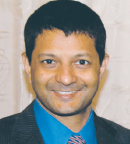
Kenneth C. Anderson, MD
AT A PREMEETING webinar, American Society of Hematology then President Kenneth C. Anderson, MD, Director of the Lebow Institute for Myeloma Therapeutics and Jerome Lipper Myeloma Center at Dana-Farber Cancer Institute, Boston, commented: “This study demonstrates this new treatment has good tolerability, and it can achieve impressive responses in patients with multiple myeloma who have no other treatment options. This novel [chimeric antigen receptor] (CAR) T-cell strategy has shown promising safety and activity and reduced toxicity.”

S. Vincent Rajkumar, MD
In a separate interview, S. Vincent Rajkumar, MD, Professor of Medicine, Department of Hematology at the Mayo Clinic, Rochester, Minnesota, expressed enthusiasm about the new CAR T-cell approach. “I am excited about these results in patients with limited treatment options. I am not surprised by these results, because we heard data on this at the 2017 ASCO Annual Meeting.”
“[B-cell maturation antigen–directed] bb2121 is a good construct with a good target. It is well tolerated with few cases of [cytokine-release syndrome] or neurologic events. In fact, it is better tolerated than we thought it would be. Almost all the patients responded, and the depth of response is good. Time will tell how durable these responses are, but all the stars are aligned to suggest that CAR T-cell therapy will have a role in treating myeloma,” Dr. Rajkumar stated.
As to whether the new treatment can achieve cure in some patients, Dr. Rajkumar said, “You only know if a patient is cured retrospectively. Myeloma patients can go for many years—8 or 10—and then relapse, even if they are minimal residual disease–negative.” He added, “With these promising results, bb2121 CAR T-cell therapy will most likely be tested earlier in the course of disease.”
Regarding the expense of a single CAR T-cell infusion, estimated at about $475,000, Dr. Rajkumar said this is similar to about 3 to 4 years of treatment for multiple myeloma including stem cell transplant and maintenance therapy. “One dose of CAR T cells makes economic sense if it can take the place of transplant and maintenance,” he said.
DISCLOSURE: Drs. Anderson and Rajkumar reported no conflicts of interest.


